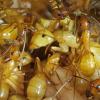I purchased my 1st two colonies of ants about a week ago and they are c. semistaceus with 4/3 workers then shortly after I received a bunch of p. californicus queens without workers. I noticed my camponotus don't really move then I looked up and it seems they are nocturnal. I placed a rag over their formicarium/test tube and I checked during day time and night time and they rarely move. The workers and queen just stand over the larva and that is pretty much it. Over a few days, i noticed one of the workers out of the 2 colonies had died and previous to that, when I received them, there was also a dead worker from the same colony. Since they are covered now and in complete darkness, could they actually tell when it is day or night? I would assume maybe a difference in temperature since it gets cool at night in California and hot during the day.
Whenever I see videos of ants online, they are constantly moving, highly active. I look at the p. californicus queens and they are constantly foraging and moving all the seeds from one location to another away from the dirty in their test tube/formicarium. I just want to make sure my camponotus are fine but I am inexperienced.














